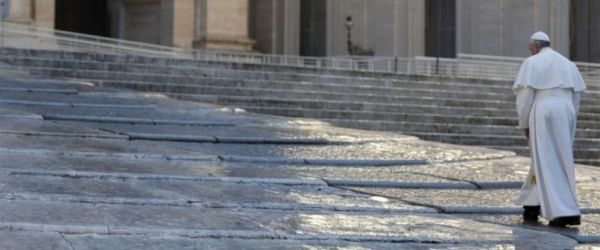One cannot live the Gospel by making compromises, otherwise one ends up with the spirit of the world, which aims at dominating others and is "the enemy of God"; but one must choose the path of service. The Pope's reflection, in his homily on Tuesday 25 February, at the Mass at Casa Santa Marta, started from the Gospel passage (Mk 9:30-37) in which Jesus tells the Twelve that if one wants to be first, he is called to make himself last and servant of all.
Jesus knew that along the way the disciples had been arguing among themselves about who was the greatest "by ambition". This fighting saying 'I must go on, I must go up', the Pontiff explained, is the spirit of the world. But the first reading of the day's liturgy (Jas 4:1-10) also echoes this aspect, when the Apostle James reminds us that love of the world is the enemy of God. "This anxiety of worldliness," the Pope remarked, "this anxiety of being more important than others and saying: 'No! I deserve this, I don't deserve that other'. This is worldliness, this - he continued - is the spirit of the world and whoever breathes this spirit, breathes the enmity of God". "Jesus, in another passage, says to the disciples: 'Either you are with me or you are against me'. There is no compromise in the Gospel. And when one wants to live the Gospel by making compromises,' he commented, 'in the end one finds oneself with the worldly spirit, which always seeks to make compromises in order to climb higher, to dominate, to be greater.
So many wars and quarrels come precisely from worldly desires, from passions, the Pope pointed out, referring again to the words of St James. It is true 'today the whole world is sown by wars. But the wars that are among us? Like the one that existed among the apostles: who is the most important?", Francis asked. "'Look at the career I've had: now I can't go backwards!' This is the spirit of the world and this is not Christian. "No! It is my turn! I have to earn more to have more money and more power'. This is the spirit of the world,' the Pontiff stressed. "And then, the wickedness of gossip: gossip. Where does it come from? From envy. The great envious,' Francis reiterated, 'is the devil, we know it, the Bible says so. From envy. By the devil's envy, evil enters the world. Envy is a woodworm that pushes you to destroy, to gossip, to annihilate the other".
In the disciples' dialogue there were all these passions and for this reason, Francis argued, Jesus rebukes them and exhorts them to be servants of all and to take the last place: 'Who is the most important in the Church? - he wondered - The Pope, the bishops, the monsignors, the cardinals, the pastors of the most beautiful parishes, the presidents of lay associations? No! The greatest in the Church is the one who makes himself the servant of all, the one who serves everyone, not the one who has the most titles. And to make this understood, he took a child, placed him in their midst and, embracing him tenderly - because Jesus spoke with tenderness, he had so much of it - he said to them: 'Whoever welcomes a child welcomes me', that is, whoever welcomes the most humble, the most servant. This is the way," Francis said, emphasising again that "the way against the spirit of the world is only one: humility. To serve others, to choose the last place, not to climb'.
One must not, therefore, "negotiate with the spirit of the world", one must not say: "I have a right to this place, because look at the career I have made". Worldliness, in fact, concluded the Pope, "is the enemy of God". Instead, we must listen to this "so wise" and encouraging word that Jesus says in the Gospel: "If anyone wants to be first, let him be last of all, let him be servant of all".
[Pope Francis, St. Martha, in L'Osservatore Romano 26/02/2020]












